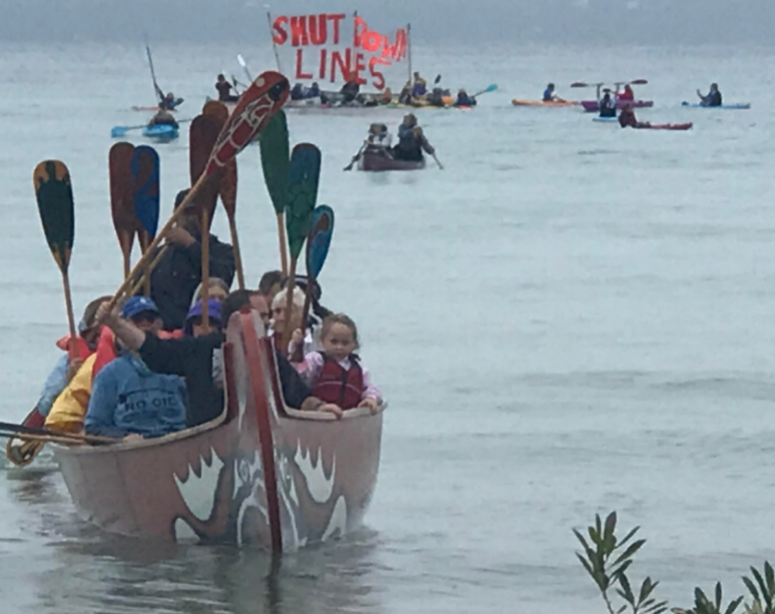
- Details
- By Neely Bardwell
Six Michigan Tribes have withdrawn their cooperation with the U.S. Army Corps of Engineers (Corps) after learning that Enbridge’s massive oil tunnel project may receive expedited approval.
Enbridge’s Line 5 is a pipeline carrying oil and natural gas liquids across the Straits of Mackinac. Spanning 645 miles from Superior, Wisconsin, to Sarnia, Ontario, the company seeks to replace the four-mile section beneath the Straits by relocating it into an underground tunnel.
To proceed, Enbridge requires a permit from the U.S. Army Corps of Engineers, which it applied for in April 2020. Under the National Environmental Policy Act, the Corps must conduct an environmental review. However, the Corps recently informed Cooperating Agencies—without the consent of Tribal Nations—that the permit will likely be issued soon under a Trump-era Executive Order declaring a National Energy Emergency.
In response, the Little Traverse Bay Bands of Odawa Indians, Bay Mills Indian Community, Little River Band of Ottawa Indians, Sault Ste. Marie Tribe of Chippewa Indians, Grand Traverse Band of Ottawa and Chippewa Indians, Match-E-Be-Nash-She-Wish Band of Pottawatomi, and Nottawaseppi Huron Band of the Potawatomi have all withdrawn as cooperating agencies.
“Tribal Nations are no longer willing to expend their time and resources as Cooperating Agencies just so their participation may be used by the Corps to lend credibility to a flawed [Environmental Impact Statement] process and document,” the tribes wrote in a letter to the Corps.
Along with federal approval, Enbridge still needs a permit from Michigan’s Department of Environment, Great Lakes, and Energy to begin construction.
Under the Biden administration, the Corps was preparing a draft Environmental Impact Statement after receiving over 17,000 public comments on the tunnel project. The agency was directed to assess the risk of oil spills from approving the tunnel project, and to consider other alternatives in its review. Now, the Corps is likely to apply emergency treatment and issue a permit for the tunnel project, without completing reviews of oil spills and other environmental impacts, alternatives, and effects on cultural resources.
“It appears the U.S. Army Corps plans to short-circuit the environmental and historic properties review by announcing they intend to use the guise of an American ‘energy emergency’ to fast-track the legally required public comment and Tribal consultation processes, greenlighting a Canadian corporation’s project that will desecrate a sacred place and threaten Great Lakes residents’ drinking water,” said Senior Staff Attorney David L. Gover with the Native American Rights Fund, which represents the Tribes.
Experts have warned of the risks associated with the aging pipeline. The tunnel project design, which has never been tried before anywhere else in the world, could lead to an explosion under the Straits.
“Resuscitating an old pipeline that carries most of its oil and gas back to Canada won’t do a thing for the US energy supply,” said Earthjustice Managing Attorney Debbie Chizewer, who is representing Bay Mills. “But it might lead to the next big oil disaster. Only this time, it will happen in the middle of the largest freshwater drinking supply in North America. We can’t allow that to happen.”
More Stories Like This
Feds release draft long-term plans for Colorado River managementApache Leader Walks 60 Miles to Court Hearing That Will Decide Fate of Sacred Oak Flat
Rappahannock Tribe Raises Sovereignty and Environmental Concerns Over Caroline County Water Permit
Klamath Indigenous Land Trust Purchases 10,000 Acres as Salmon Return
Trump signs law that revokes some limits on drilling in Alaska’s National Petroleum Reserve
Help us defend tribal sovereignty.
At Native News Online, our mission is rooted in telling the stories that strengthen sovereignty and uplift Indigenous voices — not just at year’s end, but every single day.
Because of your generosity last year, we were able to keep our reporters on the ground in tribal communities, at national gatherings and in the halls of Congress — covering the issues that matter most to Indian Country: sovereignty, culture, education, health and economic opportunity.
That support sustained us through a tough year in 2025. Now, as we look to the year ahead, we need your help right now to ensure warrior journalism remains strong — reporting that defends tribal sovereignty, amplifies Native truth, and holds power accountable.
 The stakes couldn't be higher. Your support keeps Native voices heard, Native stories told and Native sovereignty defended.
The stakes couldn't be higher. Your support keeps Native voices heard, Native stories told and Native sovereignty defended.
Stand with Warrior Journalism today.
Levi Rickert (Potawatomi), Editor & Publisher


